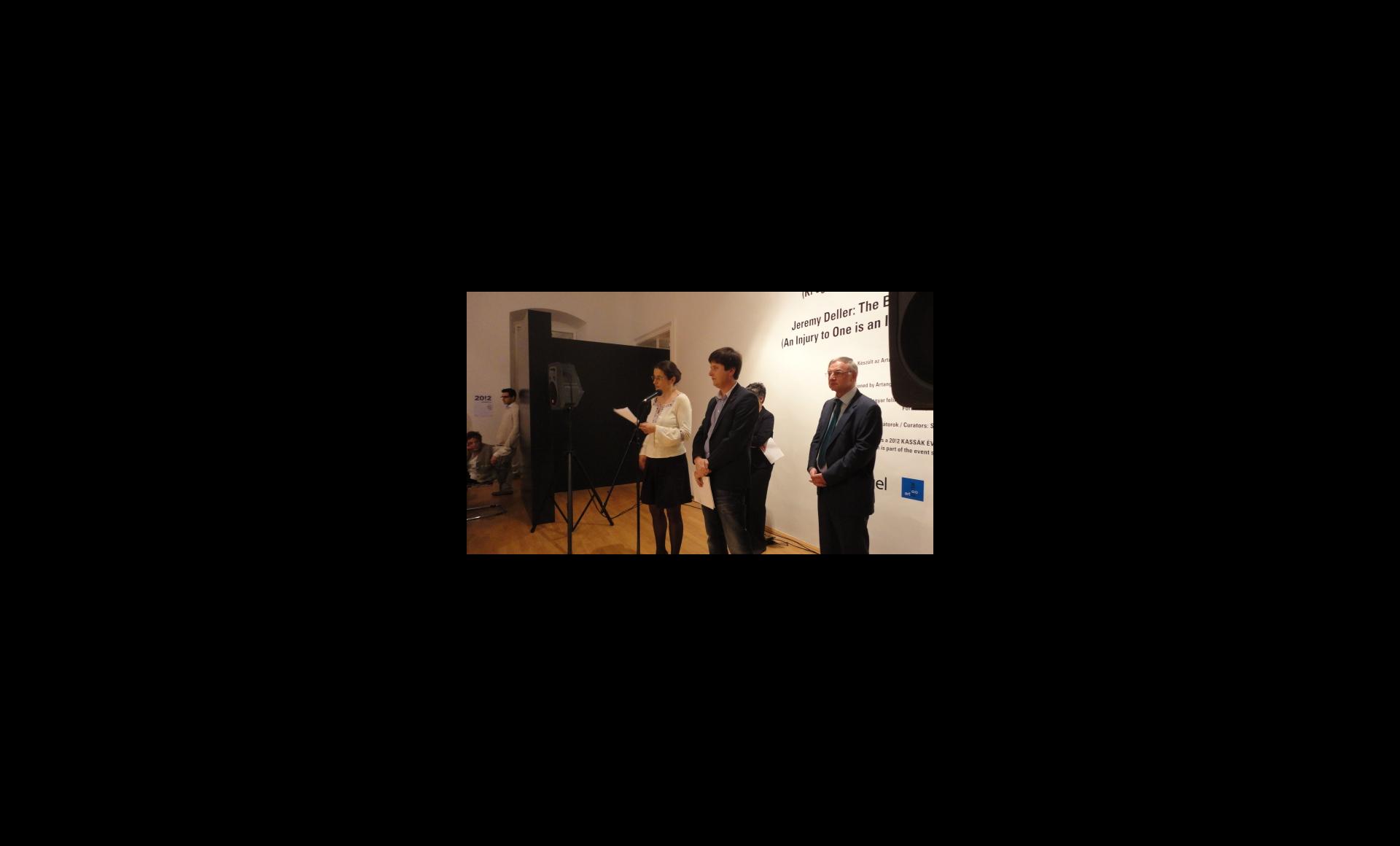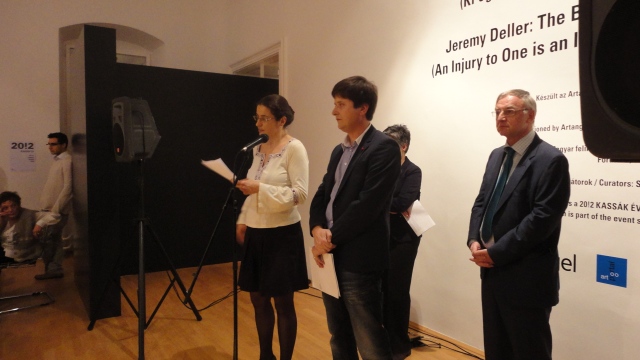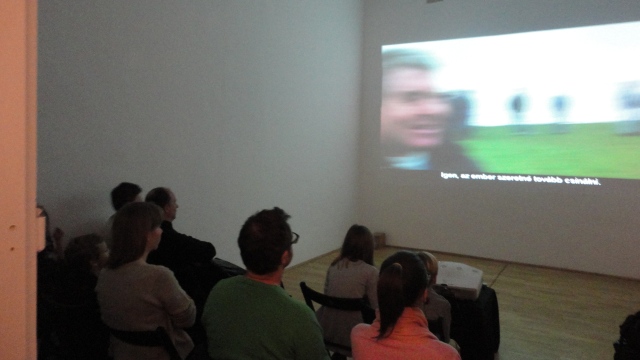

Dr. Reuben Fowkes:
“The miners, united, will never be defeated!”
There are three moments to be born in mind when considering Jeremy Deller’s The Battle of Orgreave.
The first is the original clash between striking miners and the police that took place in the midst of Britain’s bitterest episode of industrial action, which pitted the avant-garde of the worker’s movement, led by neo-Stalinist firebrand Arthur Scargill, against the merciless logic of neo-liberal economics, epitomised by the Iron Lady’s infamous statement that ‘there is no such thing as society.’
The second moment is that of the artist’s reconstruction of the Battle of Orgreave in June 2001 and its place within the remarkable career of Jeremy Deller, from the clever twist the artist gives to the documentary approach, to the complexities of this singular example of participatory performance art.
The third moment is the present, a further 11 years down the line from the re-enactment, with Deller’s work taking on a particular resonance against the backdrop of contemporary protest movements that confront the twisted logic of austerity that presents itself as the only solution to the European debt disaster, as well as very recent attempts to finally get to bottom of what really happened on that fateful mid-80s summer afternoon.
The original ‘Battle of Orgreave’ was a key moment in the cultural and political history of modern Britain, symbolising in its violence the breakdown of the social contract between the forces of law and order and those engaged in strike action. On one side you had a government with a strategy to break the power of the unions by picking a fight with what the Tories referred to as the ‘enemy within’, on the other you had the National Union of Mineworkers led by the notorious Arthur Scargill, who barely hid his own anarcho-syndicalist ambition to bring down the elected government by blocking the supply of coal to the power stations.
The film version of The Battle of Orgreave is comprised of documentary photos of the original events, interviews with participants and politicians, and footage of the reconstruction itself, including the process leading up to the staging of the re-enactment. It is worth noting that the work existed first as a performance watched by those present on the day, then as a film that was broadcast on national television, as a book, and also in the form of a gallery installation with police uniforms and other artefacts from the battle, which was made for the Turner Prize of 2004, which Jeremy Deller won.
Although Deller relied on the skills of professional battle re-enactors, who spent months researching the events of 18 June 1984, using interviews, court testimony and press reports to ensure the maximum historical accuracy of the re-enactment, one third of the re-enactors were actual inhabitants of Orgreave, and many of these had experienced or been scarred by the original events. As a result, the re-enactment was much more passionate and affecting than if the participants had been professional actors or neutral hobbyists for whom this was just one more battle scene to recreate. There is a sense in which the re-enactment provided a way to therapeutically confront the trauma of the original event by revisiting it, and even swapping roles, with many cases of striking miners being asked to play the part of the police for the re-enactment.
As an artwork, the Battle of Orgreave can be distinguished from the wave of re-enactments in contemporary art of the last decade, which involved re-making earlier artistic performances, actions or happenings, typically from the late 60s and early 70s, for audiences and contexts that remained within the circuits and frame of reference of the art world. At the same time, while Deller’s Orgreave project reaches out to the sphere of popular culture, which is certainly a characteristic of his work in general - including projects involving folk culture, popular music and parades - his re-enactment can also be distinguished from attempts in other more political contexts to rerun or remake history in order to change it. At the end of the day, and the end of the film, the police still win over the miners.
It is a remarkable fact that the truth about the Battle of Orgreave is only coming to the surface now, almost three decades after the event, breathing new life into theories voiced in the film that the battle was deliberately staged by the police in order to break the will of the striking miners. One week ago the BBC ran a news report about a new investigation launched into South Yorkshire police for ‘possible assault, perjury, perverting the course of justice and misconduct in a public office’. Central to the investigation is the observation that dozens of police statements after Orgreave contained word-for-word identical passages that were clearly designed to create the impression that the violence was started by the miners.
Part of the fascination of the Battle of Orgreave today lies in its status as the last popular struggle in Britain based on a traditional notion of class. It was an old style industrial conflict, the last gasp of the unionised world of work of the 1970s, a doomed fight for survival of a distinctive British working class culture. Today’s struggles are about equally stark issues of survival in the face of austerity and today’s protesters face an equally ruthless police machinery, but in the era of globalisation and counter-globalisation the forms and agents of protest have visibly changed, and the stubborn figure of the militant working class British miner has entered history.
What remains is the power of the miner’s chant which, corresponding to psychoanalyst and theorist Felix Guattari’s understanding of the refrain, evokes in tuneful repetition the irrepressible emotional truth of the strike: ‘The miners, united, will never be defeated...’ To hear that refrain again, many years after what in retrospect seemed like the inevitable defeat of the divided miners, will bring a lump to the throat of anyone who was touched by the Great Miner’s Strike.
(Dr. Reuben Fowkes megnyitó beszéde. Elhangzott Jeremy Deller: Az
orgreave-i csata (Ki egyet sért, mindenkit sért), 2001 című
kiállításának megnyitóján, 2012. november 23-án a Kassák Múzeumban.)
